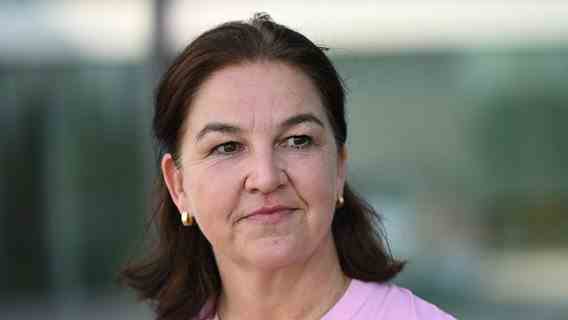Status: 07/21/2022 06:00 a.m
Millions are currently following the games of the European Football Championship, the attention for the German players is great. In everyday life, however, footballers are regularly confronted with sexist, derogatory comments. This is shown by research by NDR and SZ.
National player Almuth Schult has won pretty much everything a soccer player dreams of: Olympic gold, she was German champion six times, she was honored as world goalkeeper.
And yet prejudice still hits her: “When you’re approached by journalists: And how does it feel when you’re one of the few in the team who loves a man and not a woman?” According to Schult, the question alludes to the prejudice that only lesbian women play soccer. Sexist and derogatory comments and structures are also part of reality for many other female footballers.
Further information
This is shown by the research by NDR and Süddeutsche Zeitung (SZ), for which reporters spoke to players from the amateur league to the national team, with referees, managers and supervisors as well as coaches and officials.
Players feel ignored and smiled at
Ex-national player Tabea Kemme says, for example, that she recently experienced a conversation about a player in which the sentence was said: “She’s really hot too, isn’t she? I would also like to iron her out.”
Soccer is one of the most popular sports among girls and women in Germany and one of the most popular sports. Nevertheless, in many clubs women and men are not treated equally. They don’t have the same training conditions.
Further information
Many gamers feel ignored, ridiculed, objectified and subjected to sexist comments. It is about salacious remarks, sexist prejudices and the denial of competence. It is the hand on the buttocks in photos with fans, there are demeaning statements from spectators or even from their own coach.
“We have all learned not to listen,” says Franziska Bielfeld, an amateur player from Schleswig-Holstein. Sayings during a game like “man’s woman” or “she should take a shower with us” from spectators or male players of her own club so regularly, as if they were simply part of it.
When she addressed this at a general meeting, many would have laughed. She was even threatened afterwards. “Unfortunately, those responsible were probably not aware of what they had caused with their statements,” said club officials when asked.
Sexism is a social problem
For the DFB general secretary Heike Ullrich, the case shows that the prevention work of the association has not yet reached all clubs. She perceives sexism less as a specific problem in football and more as a social issue: “It is our task not only in football, but in our society to draw attention to these border crossings”.
Cases also in the Bundesliga
Apparently, there are also sexist failures in Bundesliga clubs. A player speaks anonymously about situations she experienced with her team’s coach: “He kept making comments about a teammate’s bottom,” she reports. He is said to have eyed another player and said how sexy she was.
Teammates and supervisors confirm the coach’s sexist sayings. “You are not seen as a professional athlete,” the player continued.
Further information
The trainer compared the performances with those of the men in dressing room speeches and during training: “We would never reach the level of the men anyway.” Before a training game against a male youth team, he is said to have said: “You lose that anyway.” The club found out about dissatisfaction among the players in the spring. The club and coach have since parted ways.
Schult complains about the behavior of the club doctor
Almuth Schult also reports unpleasant situations within a team. Her team pointed out to those responsible that a team doctor had made suggestive comments about the players. There would have been no second doctor.
Therefore, some players with health problems continued playing because they felt uncomfortable being treated by the doctor. The doctor has since left the team.
Although there is more recognition and acceptance compared to the past few decades, and better conditions, many players report to NDR and SZ that they are still treated unequally.
Women’s teams are disadvantaged
It is not uncommon for male youth teams to be preferred for training times, so that many women are only allowed to train at off-peak times. That doesn’t just happen with amateurs, but also in professional clubs, says international goalkeeper Schult. In many clubs, for example, the training clothes of men and young men would be washed, but not for women.
“Our gym isn’t as big as the men’s. We don’t have a pool or a sauna,” says Schult about her long-standing club, seven-time German champions VfL Wolfsburg, where the conditions are still very good compared to other clubs.
But it is not desirable, for example, for the women to share equipment and rooms with the men’s team. When asked, VfL Wolfsburg replies that the training areas are on different grounds and therefore “cannot be used in a pragmatic way”.
“Due to the nature of the building” there are “natural deviations in individual areas”, but for the women’s area a new cabin wing including a fitness room was built in 2019, and a sauna will be reinstalled “soon”.
Big difference in pay
The biggest difference is in the pay, although the women train just as much and have just as many games. According to the DFB, female soccer players in the Bundesliga earn an average of 2,600 euros gross per month.
Male players even earn more in the 3rd division: on average 6,700 euros. While many male footballers become fathers in their active careers, Almuth Schult is the only mother in the Bundesliga. Most players don’t seem to feel secure enough. In addition to football, they have to work, many study on the side.
Before tackling the issue of equal pay, development for the “equal distribution of resources” is important for the DFB, according to Heike Ullrich. From training times “to the use of the shower rooms”. In addition, one must work on the visibility of women’s teams. Many players are developing too slowly.
“Momentum” for change is there
Demanding fair conditions and appropriate treatment as a footballer is a struggle, says Germany international Almuth Schult, who is moving to Angel City FC in the USA next season:
“When you have the feeling that you’ve always given your all and yet nothing changes.” The big goal is not only to have this fight at some point, but simply a positive exchange. “It’s just the momentum to bring about change. It’s simply about equality and equal opportunities.”





